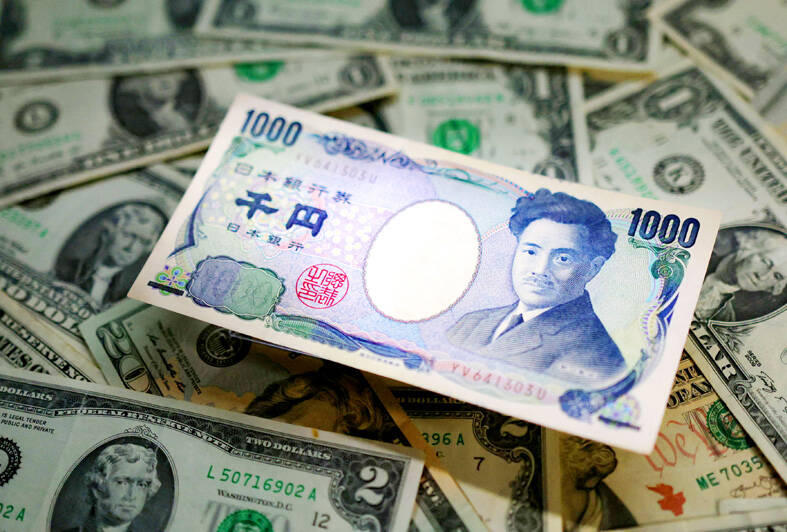The US dollar weakened on Friday after US labor data for last month showed slower wage growth, suggesting that an easing of inflation pressures might keep the US Federal Reserve’s pace of interest rate hikes modest and thereby reduce the greenback’s appeal.
The US economy last month added jobs at a brisk pace, but slower wage growth and a rise in the unemployment rate prompted financial markets to dial back expectations of a 50 basis point rate hike when Fed policymakers meet in two weeks.
Congressional testimony earlier in the week by Fed Chairman Jerome Powell was seen as hawkish and strengthened the US dollar as US Treasuries pay more in yield than other government debt.

Photo: Reuters
The US dollar slid against all major currencies, but was essentially flat against the Canadian dollar. The US dollar index, a basket of trading currencies, fell 0.64 percent to 104.64, but rose 0.11 percent from a week earlier.
Adding to the plunge in Treasury yields was the closing of SVB Financial Group, the largest bank failure since the financial crisis, as California regulators moved quickly to protect depositors at the lender.
The yield on benchmark 10-year Treasury notes fell more than 22 basis points to below 3.7 percent in the biggest single-day drop in four months. Bond yields move opposite to their price.
“There is a significant, in my opinion anyway, safe-haven bid going on,” WisdomTree head of fixed income Kevin Flanagan said. “There are concerns about potential banking stress.”
Average hourly earnings for all private workers rose 0.2 percent versus 0.3 percent in January, and lifted the year-on-year figure to 4.6 percent. Economists expected hourly earnings to rise 0.3 percent last month, which would have raised wages by 4.7 percent annually.
The US dollar might be range-bound as slowing inflation to the Fed’s target of 2 percent is likely to be bumpy, said Joe Manimbo, senior market analyst at Convera in Washington.
“When the market revises up expectations for peak rates, we see the dollar take two steps up, but once the dust settles, we see the dollar take a step back,” Manimbo said. “The market already anticipates that the Fed is going to pause this year, but exactly when it’s just unknown.”
The New Taiwan dollar shrank against the US dollar on Friday, losing NT$0.038 to close at NT$30.848, down 0.72 percent from NT$30.627 a week earlier.
The Japanese yen rose 1.15 percent to ¥135 per US dollar.
The US dollar earlier jumped against the yen in a knee-jerk move after the Bank of Japan (BOJ) kept policy unchanged in BOJ Governor Haruhiko Kuroda’s last policy meeting before he steps down in April.
While the decision was expected by most market watchers, many see the days of the BOJ’s bond yield curve control as numbered, which led to some pricing in a slim chance of a policy tweak at Kuroda’s last policy meeting.
Additional reporting by CNA, with staff writer

Hon Hai Precision Industry Co (鴻海精密) yesterday said that its research institute has launched its first advanced artificial intelligence (AI) large language model (LLM) using traditional Chinese, with technology assistance from Nvidia Corp. Hon Hai, also known as Foxconn Technology Group (富士康科技集團), said the LLM, FoxBrain, is expected to improve its data analysis capabilities for smart manufacturing, and electric vehicle and smart city development. An LLM is a type of AI trained on vast amounts of text data and uses deep learning techniques, particularly neural networks, to process and generate language. They are essential for building and improving AI-powered servers. Nvidia provided assistance

DOMESTIC SUPPLY: The probe comes as Donald Trump has called for the repeal of the US$52.7 billion CHIPS and Science Act, which the US Congress passed in 2022 The Office of the US Trade Representative is to hold a hearing tomorrow into older Chinese-made “legacy” semiconductors that could heap more US tariffs on chips from China that power everyday goods from cars to washing machines to telecoms equipment. The probe, which began during former US president Joe Biden’s tenure in December last year, aims to protect US and other semiconductor producers from China’s massive state-driven buildup of domestic chip supply. A 50 percent US tariff on Chinese semiconductors began on Jan. 1. Legacy chips use older manufacturing processes introduced more than a decade ago and are often far simpler than

STILL HOPEFUL: Delayed payment of NT$5.35 billion from an Indian server client sent its earnings plunging last year, but the firm expects a gradual pickup ahead Asustek Computer Inc (華碩), the world’s No. 5 PC vendor, yesterday reported an 87 percent slump in net profit for last year, dragged by a massive overdue payment from an Indian cloud service provider. The Indian customer has delayed payment totaling NT$5.35 billion (US$162.7 million), Asustek chief financial officer Nick Wu (吳長榮) told an online earnings conference. Asustek shipped servers to India between April and June last year. The customer told Asustek that it is launching multiple fundraising projects and expected to repay the debt in the short term, Wu said. The Indian customer accounted for less than 10 percent to Asustek’s

Gasoline and diesel prices this week are to decrease NT$0.5 and NT$1 per liter respectively as international crude prices continued to fall last week, CPC Corp, Taiwan (CPC, 台灣中油) and Formosa Petrochemical Corp (台塑石化) said yesterday. Effective today, gasoline prices at CPC and Formosa stations are to decrease to NT$29.2, NT$30.7 and NT$32.7 per liter for 92, 95 and 98-octane unleaded gasoline respectively, while premium diesel is to cost NT$27.9 per liter at CPC stations and NT$27.7 at Formosa pumps, the companies said in separate statements. Global crude oil prices dropped last week after the eight OPEC+ members said they would